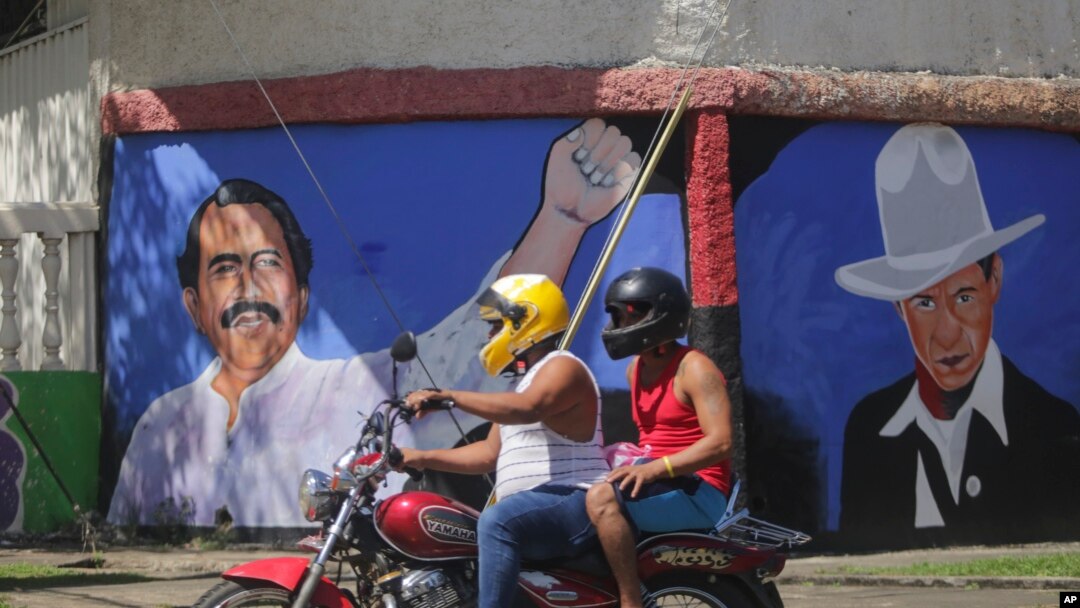Nicaraguans voted Sunday in presidential elections denounced by U.S. President Joe Biden as a "sham," as long-term leader Daniel Ortega derided his opponents -- most of them jailed or in exile -- as "terrorists."
Polling stations closed at 6 p.m. (midnight GMT) after 11 hours of voting under the watchful eye of 30,000 police and soldiers maintaining what right groups described as a climate of fear.
With seven would-be presidential challengers detained since June, 75-year-old Ortega is assured a fourth consecutive five-year term -- his fifth overall -- with his wife and vice-president, Rosario Murillo, 70, by his side.
Ortega faced five presidential contenders, but in name only -- all are dismissed as regime collaborators.
SEE ALSO: Ortega a Shoo-In in 'Sham' Nicaragua Vote
Results of the vote, which the opposition said was marked by mass abstention even as the regime claimed a high turnout, are expected within hours.
U.S. President Joe Biden said in a statement the outcome was "rigged" long before Sunday's "sham" election.
"What Nicaraguan President Daniel Ortega and his wife, Vice President Rosario Murillo, orchestrated today was a pantomime election that was neither free nor fair, and most certainly not democratic," the president said, adding the pair now run Nicaragua "as autocrats."
Former guerilla hero Ortega launched a new attack on his opponents Sunday, saying: "This day we are standing up to those who promote terrorism, finance war, to those who sow terror, death."
He was referring to Nicaraguans who took part in massive protests against his government in 2018, which were met with a violent crackdown that claimed more than 300 lives in Central America's poorest country.
Some 150 people have been jailed since then, including 39 opposition figures rounded up since June in the run-up to Sunday's vote.
Another roughly 100,000 Nicaraguans have fled into exile.
"They did not want these elections to take place," Ortega said, branding his opponents as "terrorists" and "demons who do not want peace."
Fear vied with apathy among the 4.4 million Nicaraguans eligible to cast votes in the country of 6.5 million.
"There is no one to vote for. This is an electoral circus. If they (the regime) are so sure that the people love them, why did they throw the presidential aspirants in jail?" a 51-year-old secretary told AFP.
Like many others, she was too scared to give her name.
Short lines of voters wearing face masks could be seen at some of the 13,459 polling stations, but many were empty when AFP visited.
Members of Ortega's ruling Sandinista National Liberation Front (FSLN) went from house to house calling citizens to the ballot box.
The Nicaraguan Center for Human Rights (Cenidh) said Nicaragua was a "police state" using tactics of "fear (and) social control" to "crush the opposition."
There were protests Sunday in Costa Rica, Spain, the United States and Guatemala -- countries that are home to thousands of Nicaraguan exiles.
"We want that diabolical couple (Ortega and Murillo) to leave the country and democracy to return," said Marcos Martinez, one of about a thousand demonstrators in the Costa Rican capital San Jose.
In Nicaragua itself, gatherings of more than 200 people are banned, ostensibly as a coronavirus prevention measure.
The opposition in exile has called for a boycott of Sunday's vote.
The election took place without international observers and with most foreign media denied access to the country.
Only "election attendants" and journalists from countries the government considers "friendly," such as Russia, received accreditation.
From Venezuela, President Nicolas Maduro -- his own 2018 re-election not recognized by most of the international community -- congratulated Ortega on his imminent victory, calling him an ally against the United States and Europe.
A firebrand Marxist in his youth, Ortega ruled Nicaragua from 1979 to 1990, after the guerrilla ousting of U.S.-backed dictator Anastasio Somoza Debayle.
Returning to power in 2007, he has won re-election three times, becoming increasingly authoritarian and quashing presidential term limits.
Jailed opposition figures are accused of unspecified attacks on Nicaragua's "sovereignty" under a law passed by a parliament dominated by Ortega allies, who also control the judiciary and electoral body.
Election authorities have banned the country's main opposition alliance from contesting Sunday's vote.
Nicaragua's last opposition daily, La Prensa, had its director thrown in prison in August, and Facebook announced this week it had closed a government-operated troll farm spreading anti-opposition messages.
Two-thirds of respondents in a recent Cid-Gallup poll said they would have voted for an opposition candidate Sunday.
The favorite was Cristiana Chamorro, daughter of Violeta Barrios de Chamorro, who is the only person to have beaten Ortega in an election, in 1990.
Chamorro is under house arrest, and six other presidential hopefuls are jailed in conditions their families say amount to torture.
The United States and Europe have imposed sanctions against the Ortega family members and allies.


